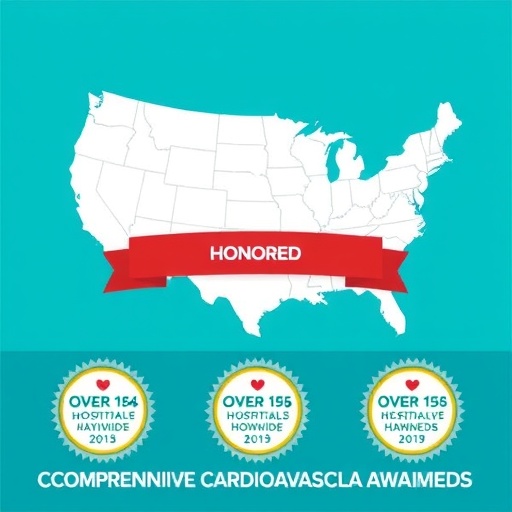
DALLAS, July 29, 2025 — Cardiovascular disease continues to dominate as the leading cause of mortality in the United States, with heart disease and stroke ranking first and fifth respectively, according to the latest data from the American Heart Association’s 2025 Statistical Update. As researchers and clinicians grapple with the staggering prevalence of these conditions, a growing consensus underscores that reducing mortality hinges not only on individual treatments but on systemic, coordinated approaches grounded firmly in evidence-based medicine.
In recognition of the urgent need to enhance patient outcomes, the American Heart Association (AHA) has introduced a prestigious Commitment to Quality award, celebrating 158 hospitals nationwide. This accolade acknowledges institutions that have demonstrated exceptional performance across multiple clinical domains within the Get With The Guidelines® (GWTG) program. Hospitals attaining this award exhibit integrated quality improvement frameworks that span at least three distinct cardiovascular and metabolic conditions, reflecting a comprehensive commitment to elevating standards of care.
Get With The Guidelines®, an innovative quality improvement initiative developed by the AHA, serves as a critical platform linking hospitals to the most current evidence-based clinical protocols. By embedding research-driven guidelines into routine clinical practice, GWTG empowers multidisciplinary care teams to optimize treatment strategies for cardiac arrest, heart failure, stroke, type 2 diabetes, and atrial fibrillation. Studies validating the program have demonstrated significant improvements in clinical outcomes, including accelerated patient recovery, decreased complications, and diminished hospital readmission rates.
.adsslot_cki6wR2TBr{width:728px !important;height:90px !important;}
@media(max-width:1199px){ .adsslot_cki6wR2TBr{width:468px !important;height:60px !important;}
}
@media(max-width:767px){ .adsslot_cki6wR2TBr{width:320px !important;height:50px !important;}
}
ADVERTISEMENT
The complexity of cardiovascular pathophysiology demands precision in therapeutic interventions. For example, timely reperfusion strategies in acute myocardial infarction and adherence to anticoagulation protocols in atrial fibrillation are lifesaving measures with narrow therapeutic windows. Get With The Guidelines standardizes such nuances by offering structured, protocolized frameworks that reduce variability in care delivery, a known contributor to suboptimal outcomes in cardiovascular disease management.
Award recognition within the GWTG program is stratified from bronze to the distinguished gold plus status, reflecting the degree and duration of adherence to key performance measures. The newly instituted Commitment to Quality award requires that hospitals maintain Silver or higher standings in at least three separate clinical programs, underscoring an institutional dedication to multifaceted quality improvement rather than isolated excellence. This multi-pronged approach aligns with current understandings of disease interconnectivity, as many patients present with overlapping cardiovascular and metabolic disorders requiring coordinated care models.
Dr. Donald Lloyd-Jones, past volunteer president of the American Heart Association and current chair of its Quality Oversight Committee, emphasizes the critical importance of systemwide synergy in cardiovascular care. He asserts that sustainable, high-quality outcomes emerge when clinical teams cohesively apply rigorous, science-based treatment across multiple patient care domains. This philosophy echoes a growing body of literature affirming that integrated care networks and continuous quality monitoring are pivotal to reducing cardiovascular morbidity and mortality.
The underpinning scientific rationale of the Get With The Guidelines program is rooted in the consistent application of randomized controlled trial findings and meta-analyses that validate specific interventions. For instance, evidence supports that standardized management pathways for heart failure, including optimized pharmacotherapy and device utilization, mitigate hospitalization rates. Likewise, adherence to stroke treatment protocols involving rapid assessment and thrombolytic therapy dramatically improves neurological recovery and long-term functional independence.
From a healthcare systems perspective, the AHA’s multifaceted approach leverages both clinical and operational metrics to drive improvement. Data collection is an intrinsic element, enabling hospitals to benchmark performance and identify gaps in care. This continuous feedback loop fosters accountability and facilitates adaptive strategies, which are essential given the dynamic nature of clinical evidence and evolving therapeutic modalities.
Importantly, Get With The Guidelines also addresses health equity by encouraging uniform application of best practices across diverse patient populations and care settings. Emerging data highlights disparities in cardiovascular outcomes related to socioeconomic factors, ethnicity, and geographic location. The program’s structured protocols help reduce these inequities by standardizing care delivery protocols, thereby ensuring that evidence-based treatments reach all patients irrespective of background.
The seamless integration of research into clinical workflows exemplified by Get With The Guidelines represents a paradigm shift for cardiovascular medicine. This initiative embodies a translation science model where clinical trials and observational studies are rapidly assimilated into real-world practice, reinforcing the cycle of continuous learning healthcare systems. Ultimately, this model holds promise for not only improving patient outcomes but also for optimizing resource allocation in a healthcare environment increasingly burdened by chronic disease prevalence.
Hospitals recognized with the Commitment to Quality award are setting a precedent for what is achievable when excellence in cardiovascular care transcends individual silos and becomes a collective institutional pursuit. Their success stories offer a blueprint for hospitals nationwide aiming to enhance patient survival and quality of life through rigorously applied science, interdisciplinary cooperation, and a relentless commitment to quality.
For more detailed information on award recipients, the American Heart Association encourages interested parties to visit U.S. News & World Report’s dedicated portal which lists honored hospitals by state and specific awards. Further insights and resources about the Get With The Guidelines program, including how hospitals can participate and track performance metrics, are available directly through the AHA’s official website.
As cardiovascular disease continues to exert an immense toll globally, innovative quality initiatives such as Get With The Guidelines exemplify the proactive steps necessary to shift the trajectory towards longer, healthier lives. Through sustained collaboration, evidence-based care, and a shared commitment to excellence, healthcare systems can meet the challenge of reducing cardiovascular death and disability in the coming decades.
Subject of Research: Cardiovascular Disease Quality Improvement and Clinical Outcome Enhancement via Evidence-Based Guidelines
Article Title: American Heart Association Honors Hospitals with Commitment to Quality Award for Advancing Cardiovascular Care
News Publication Date: July 29, 2025
Web References:
https://www.ahajournals.org/doi/10.1161/CIR.0000000000001303
https://www.heart.org/en/professional/quality-improvement/get-with-the-guidelines/get-with-the-guidelines-heart-failure
https://www.usnewsbrandfuse.com/AmericanHeartAssociation/
http://www.heart.org/quality
Tags: American Heart Association awardscardiovascular disease managementclinical excellence in heart carecomprehensive cardiovascular careevidence-based medicine in cardiologyGet With The Guidelines programhospitals recognized for quality careintegrated care for cardiovascular conditionsmultidisciplinary approaches in healthcarequality improvement in hospitalsreducing heart disease mortality





